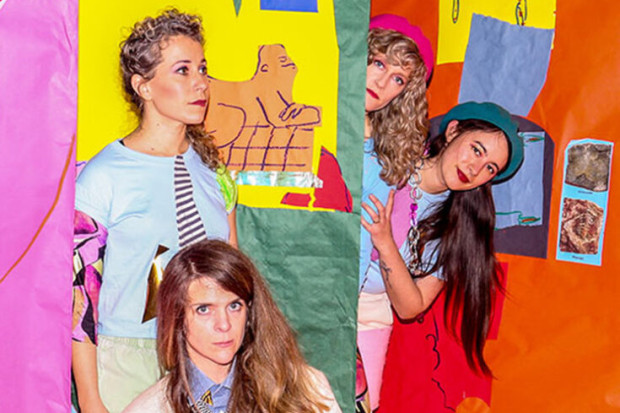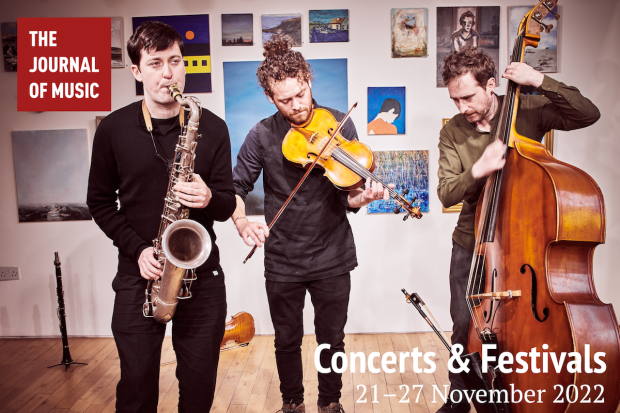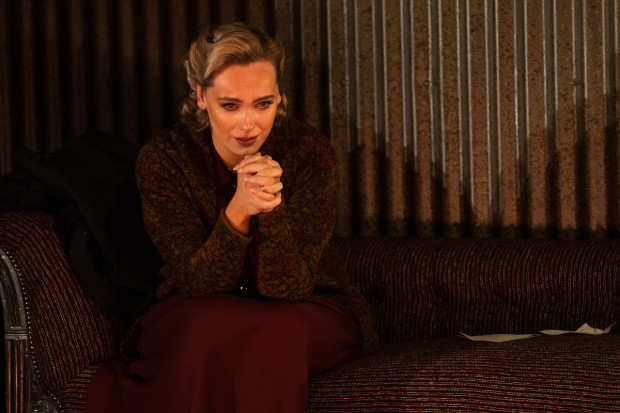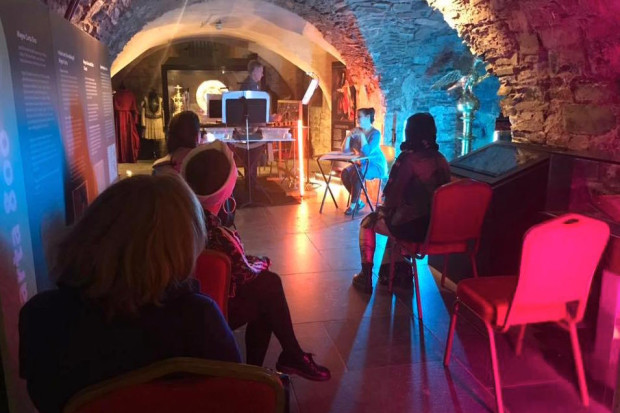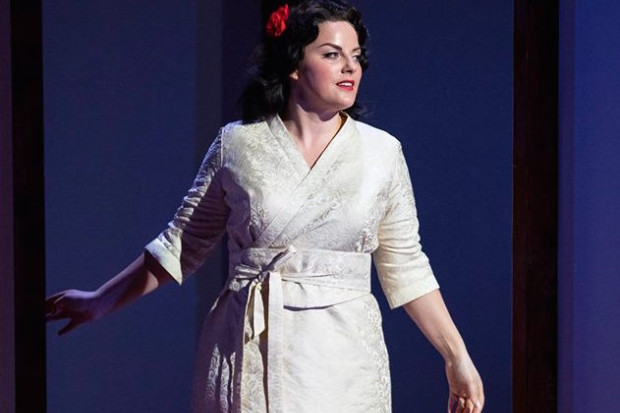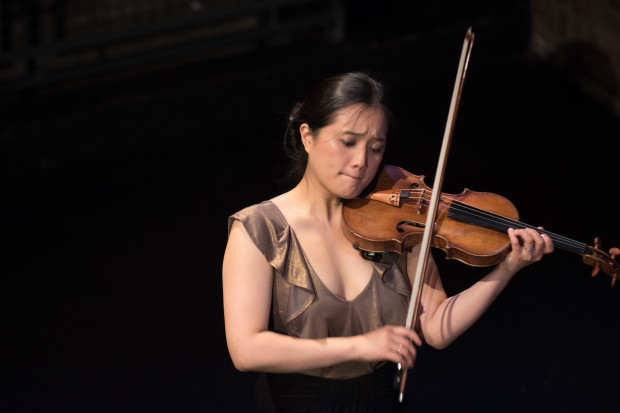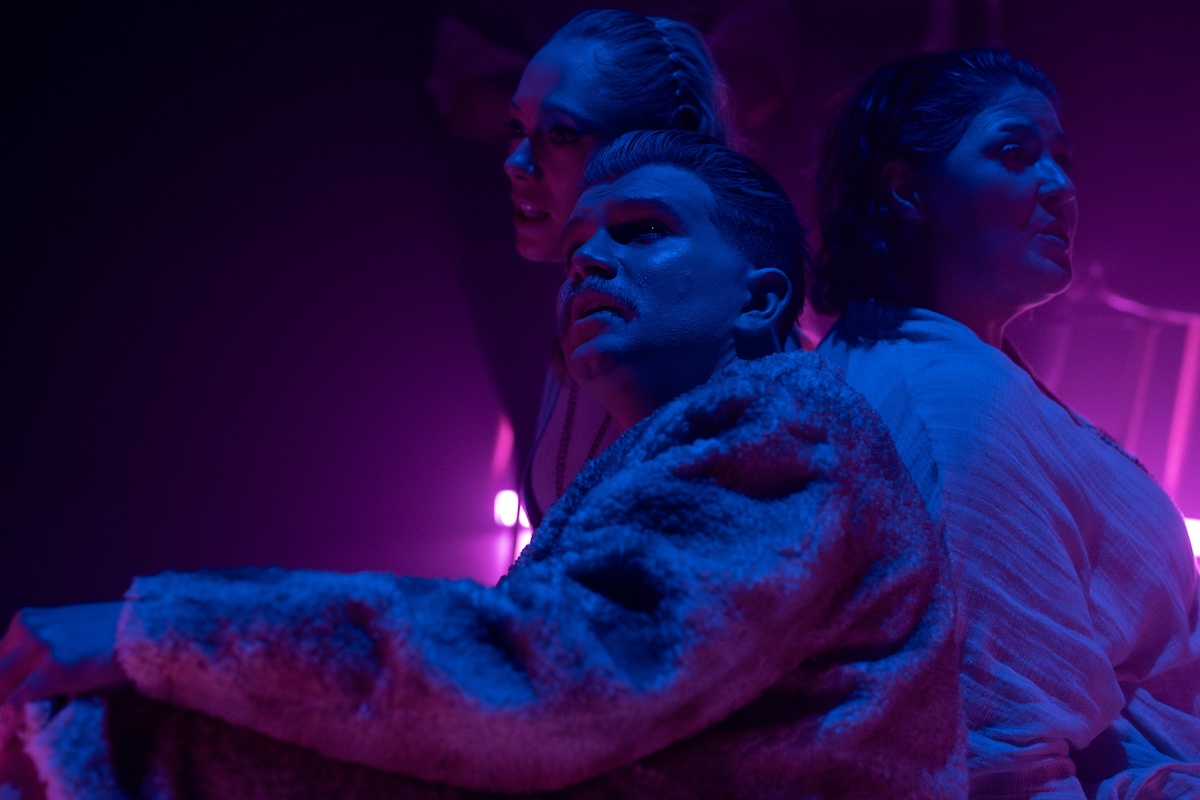
Kelli-Ann Masterson, Andrew Gavin and Michelle O’Rourke in 'Breathwork' (Photo: Pat Redmond)
The Climate Crisis Has to be Felt
Last week saw a number of performances of Breathwork, a new short opera by Éna Brennan performed in the Cube at the Project Arts Centre, Dublin. A trio of singers – Andrew Gavin, Michelle O’Rourke, and Kelli-Ann Masterson – perform live with pre-recorded accompaniment from Sarah Sew (violin), Brian O’Kane (cello), Eric Castillo Mora (trumpet) and Ross Lyness (trombone). Built on the theme of climate change, the work’s words describe a destroyed and desolate landscape combining a text by the seventeenth-century poet Abraham Crowley with a new libretto by David Poutney. This is Brennan’s second collaboration with Irish National Opera, after 2020’s insular Rupture for the organisation’s ‘20 Shots of Opera’.
Breathwork is an experience of total immersion in the space. We enter into darkness, struck first by sound – trombone drones and whispers – and are shown to our seats. There is some light in the darkness: a spotlight creates a tight circle on the floor, and the audience’s ten or so chairs are positioned in groups of three or four on its circumference, facing inwards. Beneath the chairs are fluorescent bulbs. Otherwise, the room is dark. The diameter of the light is perhaps two and a half metres, making the most tightly intimate space I’ve ever attended; the distance to the performers at the beginning is less like watching singers on a stage than viewing paintings in a gallery.
At the centre of the spotlight, intertwined with each other, the three singers whisper frantically even as we take our seats. Clad and made up in white, evocative of the Moirai – the Greek Fates – their roles, per the programme note, are as three Questioners, but for now only scraps of words and phrases are audible. ‘Lamentation.’ ‘Too late.’ ‘Did we do this?’
The whispers cohere into notes, the scraps of speech into sentences, and there’s a sense of ritual and almost religiosity in the phrases of long repeated notes. Bits of melody manifest, first in the accompaniment, then in the vocals, but they’re the exception. There’s a sense of tactility in the music, in describing the desolate landscape – a grumbling, guttural low trombone note, an eerie, lost violin. For the most part, the music is these sparse, oppressive textures – quite different from the lush, sardonic romanticism of Rupture – but with the occasional melodic outburst or surprise consonance – a dominant–tonic resolution or minor third that flashes like a bulb of hope among the warning of the work.
Watching each other
As the music develops, the trio exits the spotlight separately through gaps between the groups of chairs, and slowly circles the audience. Their movement is ponderous and unearthly, singing towards each other across the listeners’ heads. There’s a weight of accusation in the words and the performance, the trio sometimes returning to the centre and holding uncomfortably prolonged eye contact with the audience, but eventually spiralling out and disappearing as the space fills with fog. The accusation is emphasised by the staging: the audience cannot watch the Questioners without watching each other.
Breathwork is a companion piece to a larger upcoming opera by Brennan – Hold Your Breath, due to be premiered in August of next year, and with which it shares text and harmonic language – but it stands alone as a powerful and challenging work. Its use of space – physical and conceptual and even temporal – suits the scale of the staging, and leaves it as quite a different experience from what a full opera will be.
Most people nowadays are aware of both the reality and the extent of climate change, on at least an intellectual level, and the audience for a work like this is not attending to be convinced. So why does it exist?
I remember watching Greta Thunberg, as she first emerged to public attention, speak truth to power at the United Nations, and watching power respond with polite applause. Since then, power has done little to slow our progress towards disaster. Awareness alone is not enough. Breathwork is a work of indictment and culpability and warning. Its message is not new. It’s not hopeless, but it grapples with the urgency and seriousness of the moment. At the end, the audience in the dark faces each other alone. We did this. It’s not enough for that to be known and understood. It has to be felt.
Irish National Opera’s current production, Gounod’s Faust, runs at the Gaiety Theatre until 7 October. Visit www.irishnationalopera.ie.
Published on 3 October 2023
Brendan Finan is a teacher and writer. Visit www.brendanfinan.net.










